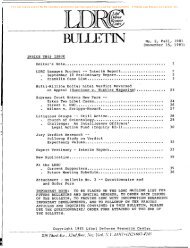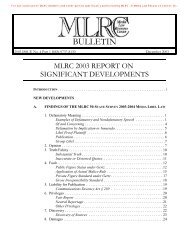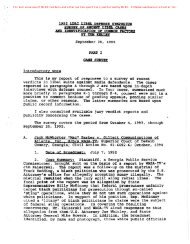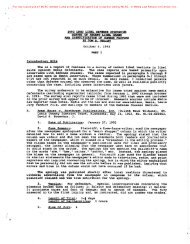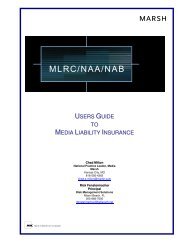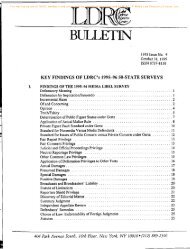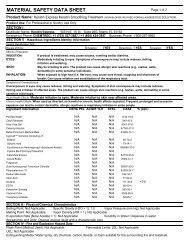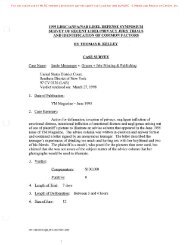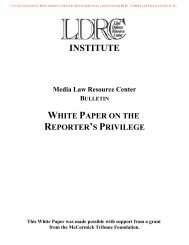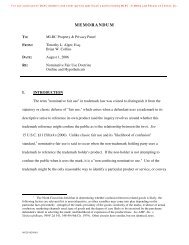2006 MLRC/NAA/NAB LIBEL DEFENSE ... - Directrouter.com
2006 MLRC/NAA/NAB LIBEL DEFENSE ... - Directrouter.com
2006 MLRC/NAA/NAB LIBEL DEFENSE ... - Directrouter.com
You also want an ePaper? Increase the reach of your titles
YUMPU automatically turns print PDFs into web optimized ePapers that Google loves.
For exclusive use of <strong>MLRC</strong> members and other parties specifically authorized by <strong>MLRC</strong>. © Media Law Resource Center, Inc.allegedly authorized his father’s conduct when, in fact, the regulation had not been adopted atthe time of the events at issue. The plaintiff also denied suffering any emotional distresssymptoms before publication of the article, but later admitted that he had asserted a claimagainst the vocational school for defective construction that included claims for emotionaldistress, conscious pain and suffering and loss of consortium. The plaintiff’s only economicdamages witness testified that he refused to hire the plaintiff to handle any litigation after thearticle because of concerns about the “baggage” the plaintiff carried from the article; in fact,the witness had retained the plaintiff after the litigation and was himself a disgruntled subjectof an unrelated Globe article, raising further questions as to his credibility.19. Results of Jury Interviews, if any:A reporter covering the trial interviewed the jury foreperson. A summary of her<strong>com</strong>ments are below:The forelady, Barbara E. Proia, 44, of Framingham, said the jurors focused on what theGlobe published, and as they did that, they concluded that the story was not as harmful toColumbus as Columbus claimed. She also said that the jurors accepted as truth Robinson’sversion of how the story was reported and then published by the Globe. “We didn’t see thearticle was that damaging for him to put in all the claims,” she said. “We think the house did it tohim, not the story.”Proia said twelve of the fourteen jurors sided with the Globe and two voted in favor ofColumbus. However, she said, even if the verdict went in Columbus’ favor, the jury would onlyhave awarded nominal damages because they don’t feel he was hurt by the story. “The storydidn’t say he was a bad person,” she said, adding the three other people focused on in the storywere more harshly treated.She said that the jury concentrated on what was published in the Globe and not howColumbus’ witnesses described the newsgathering tactics used by Robinson and the Globe toprepare the story. “We didn’t focus on that because they weren’t in the article,” she said. Proiasaid jurors were convinced by Robinson’s testimony that his version of events was the mostaccurate. “We all felt what he said was real,” Proia said. “He really knew what he was talkingabout...they were telling the truth. I really felt that they were telling the truth, the Globe. They didthe best report they could with the information they had.”Proia said jurors were troubled by the involvement by Columbus’ father in the applicationprocess, which she said jurors concluded was a violation of the state conflict of interest laws. Shesaid that Columbus and his father should have followed the state ethics rules, and if they did so,he still would have met the application deadlines. “That was obviously an ethics violation,” shesaid, adding if Columbus had followed the rules, he would not have been subject of a Globestory, and would have not had any reason to sue the Globe. She said there was no problem withthe lottery, just how Columbus obtained the necessary building permit. “The stress of building ahouse, that’s what put him over the edge. I don’t think the story put him over the edge.”11



